General Meetings are where the big decisions are made for the RIPE NCC by its members. There can be heated discussions on the mailing lists, but it’s votes at GMs that give the clearest indication of what our members want. In this article, we take a closer look at who registered to have their voices heard at our May 2024 GM.
May GMs are where our members get to vote on two particularly important RIPE NCC topics: the Charging Scheme and the Executive Board election. As a result, these meetings tend to draw more attention than autumn GMs, and as you can see below, this year was no exception. 2,002 members registered to vote for one of three charging scheme options and to fill two seats on the board, with 1,682 votes cast in total, which amounts to an 8.5% turnout among eligible members.
8.5% might sound low, and in fact, that number is only a little below average for a May GM. That said though, it's important to make clear that we do encourage all our members to vote. We send out bulk emails, personalised emails, social media posts, news announcements, reminders during presentations... But even as we keep trying to push the numbers up, we also have to realise that not all the diverse organisations out there who need Internet numbers from the RIPE NCC to make their networks work are interested in participating in the governance of their regional RIR.
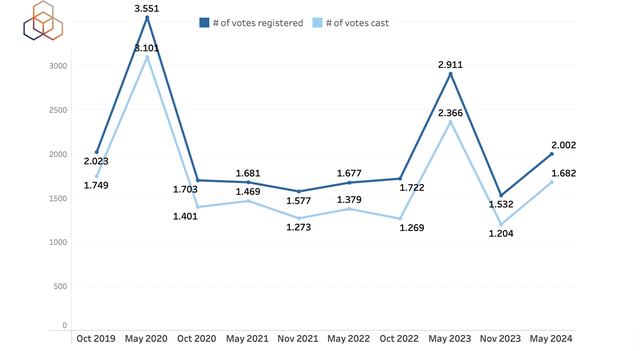
The goal of this article is to take a closer look at the organisations who chose to get involved by registering to vote at the May GM. Where do they come from? How long have they been members of the RIPE NCC? What resources do they hold? We aim to answer these questions and, in doing so, perhaps get a clearer understanding of how the voting population reflects the overall membership.
A couple of quick notes before we begin...
- Throughout, we'll refer to the members that registered to vote in the May 2024 GM as members that voted and the rest as members that didn’t vote. In fact, of the members who registered to vote, only 84% went on to cast their votes. But since there's no way for us to know who actually voted and who didn't, our analysis must be based on those who registered to vote (though we'll be keeping in mind that 16% of those didn't cast their vote).
- Another caveat before we go into the numbers is on the difference between LIRs and members. The RIPE NCC has LIRs and members, and for the most part there's not much difference between the two, unless you happen to be working with membership data. Simply put, a member can have multiple LIR accounts, but no matter how many LIRs a member may have, they only get one vote. In this article, we will be focusing on members rather than LIRs.
Country statistics
After each GM, we publish a Voting Report as well as a table showing the number of members registered to vote from each country. We put the country stats on the website because it's relatively easy to get that data using the RegIDs and because it gives us a way of spotting interesting trends over time. And who knows, maybe stoking a little national fervour might even help to encourage members to vote.
At recent GMs and in the RIPE NCC Survey, we received feedback that country-based stats might not be so relevant. Some prefer to see the bigger picture and not lose focus by looking at the countries in isolation. Still, we wanted to start with a country-by-country view of things in the hopes that some of these observations might be of interest.
It’s common knowledge that our German members are leading both in terms of number of LIRs and number of voters. All GMs since 2020 saw more German members than any other country. Second to Germany comes Russia, and then there are a lot of members voting from the Netherlands, the UK, and France. This is to be expected given that these countries have many members and their members are very active at RIPE Meetings.
This year was no exception, with German and Russian members making up 14% and 9% of the registered voters. We did see a change with members from Turkey, approximately twice as many of whom registered for this GM compared to previous GMs. In fact, with 97 members registering, they became the seventh-highest-voting country at the GM, and over half of these did not register in the previous three years!
Following Turkey is Poland, the host country for the RIPE Meeting and the GM. With 80 members, Poland is well-represented among the voters. But given the meeting was held in Krakow and there was a Polish candidate for the board, this is maybe less than we might have expected.
Ukraine is an interesting country to look at after last year’s May GM, where 199 members from Ukraine registered to vote. This was almost certainly due to the fact that two prominent Ukrainian community members were Executive Board candidates, resulting in a turnout higher than 50% among Ukrainian members. At this GM, 69 Ukrainian members registered to vote, which is perfectly ordinary considering the number of members we have from there and their voting history before last year.
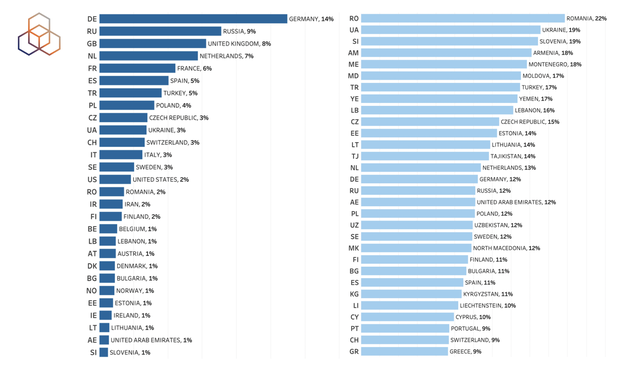
Generations of members
One of the most indicative stats is the age of the members because when a member became a member says a lot about them. Members from different decades had different experiences given that the community, the membership, and the availability of resources changed a lot over time. They likely saw different challenges, and had different priorities and expectations as to what being a member of the RIPE NCC involved.
The below graph shows how many of our current members became a member each year, separately for members who voted and didn’t vote at the GM this May. We have a very young membership with so many of them having joined in the late 2010s. This is reflected in the voting members, but not as strongly. Despite members from 2017 and onwards making up half of the members that voted, some of our older members keep their voices heard by showing up for the GM.
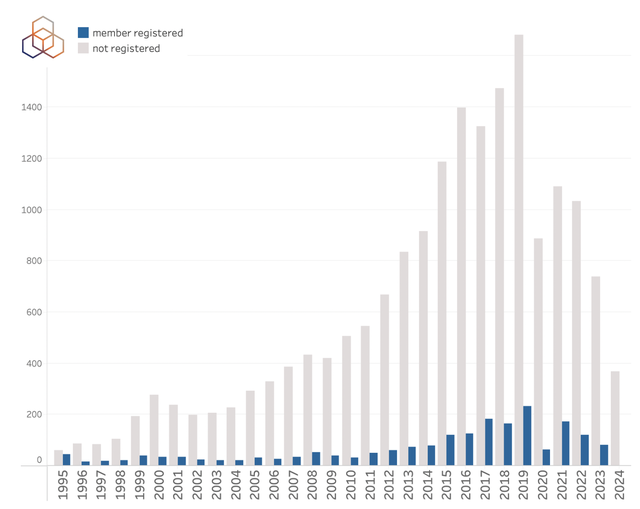
Voter resources
Given the Charging Scheme being up for voting, looking at the resources held by the voting members could be insightful. Do the members vote depending on their resources? Do the voting members differ from the rest of the membership in terms of the amount of resources they hold?
The below graph shows the distribution of members that voted and didn’t vote at the last GM relative to how much allocated IPv4s they hold. The largest group is 2-4 /24s with almost 40% of the membership falling in this category. The distribution of voting and non-voting members are similar apart from the groups with 2-4 /24s and those with over 32 /24s. Voting members are significantly more likely than non-voters to have more than 32 allocated /24s when the resources held by all the LIRs they may have are combined.
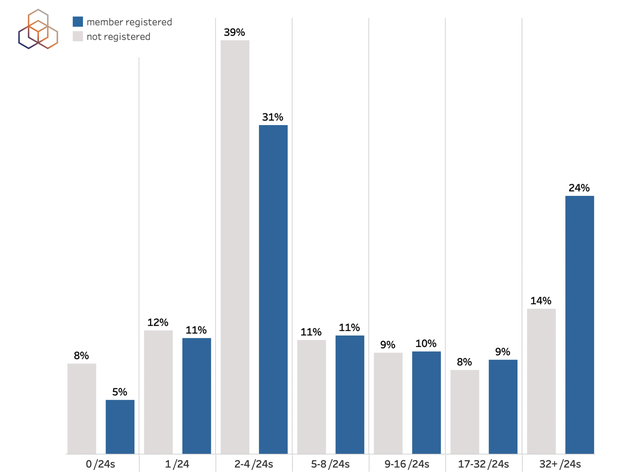
Voting members are also more likely to have more allocated IPv6 space, or any allocated IPv6 space. Only 13% of the members who registered to vote don’t have any allocated IPv6 space, while this number is 26% for members that didn’t register to vote. A similar situation is observed with ASNs, with members voting at this GM being more likely to have multiple ASNs compared to those that didn't vote.
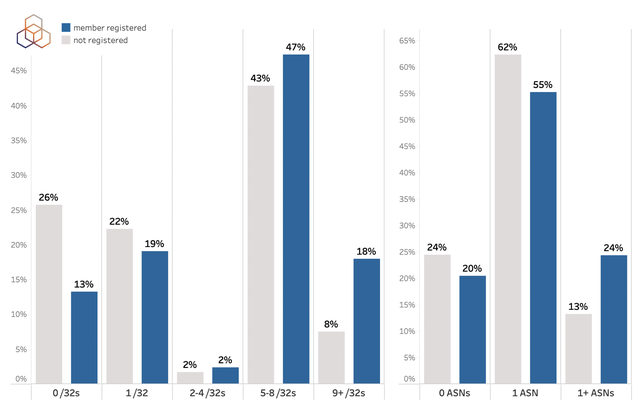
We also looked at PI sponsorship and noticed voters are slightly more likely to sponsor PI resources. Note that PI space is not held by the member, but by the end user the member sponsors. This process was also affected by the runout when we reached the last /8 in 2012. After that, members couldn’t get PI space to sponsor end users, but could only take over sponsoring end users with PI space. Similar to allocated resources, this too is related to the age of the member and not completely independent.
As we look at the total resources held by the members regardless of the number of LIRs they might have, the impact of having or having had multiple LIRs comes to mind. Do the voters have multiple LIRs? 5% do. It’s 3% among non-voters.
Some firsts at this GM
Member proposals
All these stats help give us better insights on voters, but we can't know what they’re thinking just by looking at the demographics. Luckily, this time we had agenda proposals for the GM from the members, open to be signed by members if they agree and would like to show support. The first proposed agenda topic titled “Keep current billing scheme for the next year” received 711 endorsements. That's a lot of support! But only 372 of those that signed this proposal registered to vote.
2FA
This was the first ever GM where it was mandatory to have two-factor authentication (2FA) enabled before members could access the registration form. On 27 March, we made 2FA mandatory for members using RIPE NCC Access and opened registrations for the GM on the same day. So in order for a member to register for the GM, they needed to have enabled 2FA. We were curious if this made an impact on GM registrations, or if the GM could have encouraged members to enable 2FA. The GM turnout seems unaffected by this change as most members that tend to vote have been playing with 2FA for some time anyway. On the other hand, we did observe many accounts enabling 2FA on the same days as many members registering for the GM.
Summary
All in all, even though the content and topics raised a lot of interest for many, this was a pretty standard GM in terms of the stats. May GMs are always more exciting, with money and people up for voting, both of which shape the structure of the RIPE NCC. And with this GM, for the first time, we had proposals from the members and mandatory 2FA.
However, looking at the demographics of the voting members, we don’t see anything particularly unusual. Every year we see surges in registration from some countries, but they don't last. The voters appear to join for a specific reason, but then seem less interested in general governance and often do not return the next year.
Perhaps it’s time we share this type of voting analysis more regularly. If you have comments on what you see as interesting from this analysis so we can include that aspect in future reporting, be sure to let us know in the comments below. Similarly, if you are a member who did not register for this GM, we’d be interested to hear why.




Comments 1
Arash Naderpour •
Thank you to the RIPE NCC for your excellent work on this report! The insights and information you've provided are valuable to the community.